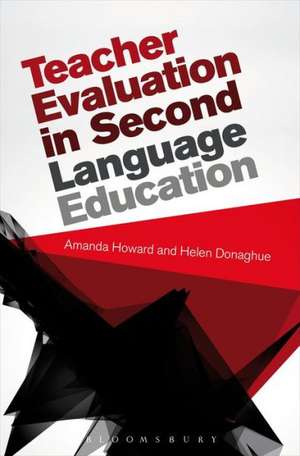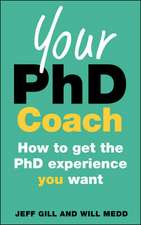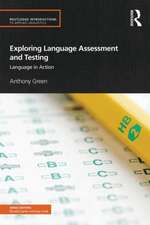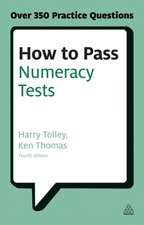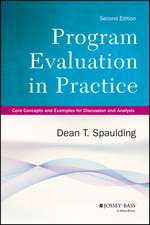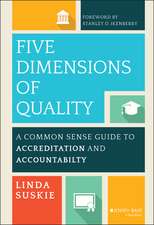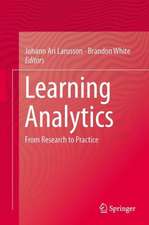Teacher Evaluation in Second Language Education
Autor Amanda Howard, Helen Donaghueen Limba Engleză Paperback – 17 dec 2014
| Toate formatele și edițiile | Preț | Express |
|---|---|---|
| Paperback (1) | 237.66 lei 3-5 săpt. | |
| Bloomsbury Publishing – 17 dec 2014 | 237.66 lei 3-5 săpt. | |
| Hardback (1) | 831.43 lei 6-8 săpt. | |
| Bloomsbury Publishing – 17 dec 2014 | 831.43 lei 6-8 săpt. |
Preț: 237.66 lei
Preț vechi: 273.27 lei
-13% Nou
Puncte Express: 356
Preț estimativ în valută:
45.47€ • 47.73$ • 37.75£
45.47€ • 47.73$ • 37.75£
Carte disponibilă
Livrare economică 20 martie-03 aprilie
Preluare comenzi: 021 569.72.76
Specificații
ISBN-13: 9781472511829
ISBN-10: 1472511824
Pagini: 232
Ilustrații: 5 illus
Dimensiuni: 156 x 234 x 12 mm
Greutate: 0.36 kg
Editura: Bloomsbury Publishing
Colecția Bloomsbury Academic
Locul publicării:London, United Kingdom
ISBN-10: 1472511824
Pagini: 232
Ilustrații: 5 illus
Dimensiuni: 156 x 234 x 12 mm
Greutate: 0.36 kg
Editura: Bloomsbury Publishing
Colecția Bloomsbury Academic
Locul publicării:London, United Kingdom
Caracteristici
Unlike other treatments of evaluation, this book deals with materials, testing and their conjunction with evaluation.
Notă biografică
Amanda Howard has worked as an English language teacher, teacher educator, lecturer and coordinator for institutions and universities both in the Middle East and the UK and has extensive experience with both undergraduate and postgraduate students. She researches and writes in the areas of teacher evaluation, observation and feedback in educational settings, language teaching pedagogy and Young Learner education.Helen Donaghue is a Senior Lecturer in English Language Teaching at Sheffield Hallam University, UK. She has worked in TESOL and teacher education in Hungary, the United Arab Emirates and the UK. Her teaching interests include EAP, teaching L2 reading and language testing and her research interests focus mainly on institutional interaction in educational settings. She is currently researching the co-construction and negotiation of face and identity in post observation feedback meetings.
Cuprins
Notes on ContributorsTranscription ConventionsAcknowledgementsIntroduction, Helen Donaghue and Amanda HowardPart 1: Key Approaches1. Reflective dimensions of CPD: supporting self-evaluation and peer-evaluation, Steve Mann and Steve Walsh 2. Mentoring for teacher evaluation and development, Leonardo A. Mercado and Steve Mann 3. Observing for feedback: a counselling perspective, Mick Randall Part 2: Tools for Investigation and Collaboration4. From bit to whole: reframing feedback dialogue through critical incidents, Radhika Iyer-O'Sullivan5. Artifacts in scaffolding the construction of teaching knowledge, Marion Engin6 .A system for teacher evaluation, Phil QuirkePart 3: Focus on Discourse7. Differences between supervisors' espoused feedback styles and their discourse in post observation meetings, Helen Donaghue8. Evaluative talk in feedback conferences, Fiona Copland 9. Student teacher placements: a critical commentary, Neil Hunt Part 4: Participant Responses10. Evaluating experienced teachers, Mick King 11. Reflective peer observation accounts: what do they reveal?, Wayne Trotman12. Giving voice to participants in second language education, Amanda HowardIndex
Recenzii
[C]lear, concise ... [and] very reader-friendly ... I thoroughly recommend this book to anyone involved in the evaluation and education of language teachers in both research and practice ... It more than meets its goal of encouraging a reconceptualization of teacher evaluation.
[T]his volume will be valuable for many readers involved in teacher evaluation and development, particularly via lesson observation and feedback. Various contributors offer fresh and thought-provoking perspectives on familiar issues ... Taken as a whole, the book provides a strong argument for developing processes which empower teachers as active, reflective agents in their own professional learning.
This book is timely and very relevant in today's world of increased accountability and performance reviews related to teaching a second language. This edited book provides a wide variety of excellent ideas for reflectively evaluating (e.g. self-peer-mentor evaluation) teachers, whether novice teachers in teacher education programs or experienced teachers in in-service programs and written by practitioners and researchers from a variety of international contexts.
This is a collection rich in insight and brimming with practical suggestions. It should be essential reading for anyone involved in evaluating the work of teachers, whatever the subject.
This book offers unique insights into the purposes, policies and practices of teacher evaluation. With its combined academic and practitioner perspectives which amplify the voices of those at the centre of the evaluation process, i.e. the language teachers, the volume represents a valuable reference for anyone involved in language teacher education research and practice and offers a range of innovative research as well as pedagogical tools for critiquing existing approaches and advancing those teacher evaluation practices that have meaningful development of language teachers at their heart.
Teacher Evaluation in Second Language Education provides another invaluable piece of the puzzle that helps us to uncover, understand and appreciate the very complex world of second language teacher education. The specific focus on teacher evaluation, moving from the broad framework of reflective practice to a detailed examination of observation and feedback from different perspectives, allows for a more comprehensive discussion around these themes than has been seen previously. Drawing on evidence from a wide range of international contexts, the contributors use evidence-based accounts combined with intelligent interpretations to bring the reader through a myriad of teacher evaluation experiences, tools, methods and accounts. This book is a must read for anyone involved in second language teacher education and will take pride of place on my own book shelf. Congratulations to the editors on a job very well done.
[T]his volume will be valuable for many readers involved in teacher evaluation and development, particularly via lesson observation and feedback. Various contributors offer fresh and thought-provoking perspectives on familiar issues ... Taken as a whole, the book provides a strong argument for developing processes which empower teachers as active, reflective agents in their own professional learning.
This book is timely and very relevant in today's world of increased accountability and performance reviews related to teaching a second language. This edited book provides a wide variety of excellent ideas for reflectively evaluating (e.g. self-peer-mentor evaluation) teachers, whether novice teachers in teacher education programs or experienced teachers in in-service programs and written by practitioners and researchers from a variety of international contexts.
This is a collection rich in insight and brimming with practical suggestions. It should be essential reading for anyone involved in evaluating the work of teachers, whatever the subject.
This book offers unique insights into the purposes, policies and practices of teacher evaluation. With its combined academic and practitioner perspectives which amplify the voices of those at the centre of the evaluation process, i.e. the language teachers, the volume represents a valuable reference for anyone involved in language teacher education research and practice and offers a range of innovative research as well as pedagogical tools for critiquing existing approaches and advancing those teacher evaluation practices that have meaningful development of language teachers at their heart.
Teacher Evaluation in Second Language Education provides another invaluable piece of the puzzle that helps us to uncover, understand and appreciate the very complex world of second language teacher education. The specific focus on teacher evaluation, moving from the broad framework of reflective practice to a detailed examination of observation and feedback from different perspectives, allows for a more comprehensive discussion around these themes than has been seen previously. Drawing on evidence from a wide range of international contexts, the contributors use evidence-based accounts combined with intelligent interpretations to bring the reader through a myriad of teacher evaluation experiences, tools, methods and accounts. This book is a must read for anyone involved in second language teacher education and will take pride of place on my own book shelf. Congratulations to the editors on a job very well done.
